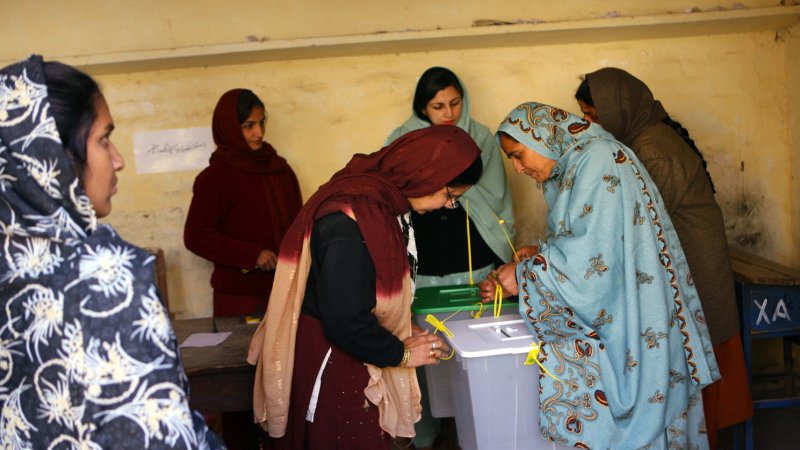Pakistani women prepare a class room as a polling station for Pakistan's general elections at an school in Rawalpindi, Pakistan on February 18, 2008. (File/UPI Photo/Hossein Fatemi/Fars News Agency) |
License Photo
ISLAMABAD, Pakistan, March 26 (UPInext) -- With Pakistan facing landmark general elections May 11, cultural bars on women voting are so entrenched in conservative parts of the country that thousands of women are unlikely to vote, interviews show.
This is the first time in Pakistan's 66-year history that one civilian government will replace another through a vote.
Nevertheless, thousands of women, especially in restive Balochistan and Khyber Pakhtunkhwa provinces, bordering Afghanistan, are unlikely to cast their ballots. Even the Election Commission of Pakistan (ECP) has done little to end the taboo, critics say, although interviews show Pakistani women are interested in taking part in the poll.
Interviews in Mianwali, a city in Punjab province, where women were barred from voting in a 2012 by-election, showed that women are prevented by male elders from going to polling places, let alone contesting elections. A village woman who asked that her name not be used said she wanted to vote in the May elections but said, "I'm sure my husband won't allow me to do so." She said she had not voted in any election but that her sisters in Lahore "not only cast their vote but also attend political gatherings in their city."
"I will vote for the Pakistan Tehrik-e-Insaf candidate if my husband allows me to go to polling station," the woman said, referring to the party of former cricket star Imran Khan, although she added that she didn't know much about her political and human rights.
Khurshid Alam Baba, a tribal elder of the city of Malakand, in Khyber Pakhtunkhwa, where women were barred from voting in 2008 general elections, said by phone that women's participation in the election process was against Islamic teachings and tribal culture, so they were not allowed to leave their homes to take part in the elections.
"Women are a weaker creature," he said. "They can't differentiate between a good candidate and a bad candidate."
"It is also against our culture," he said, to allow women to mingle with men and go outside the home "without any valid reason."
Mr. Baba said elders would reject any government effort to enforce a decision that violated their culture and Islamic teachings.
"We don't want to invite wrath of militants and Taliban by allowing our women to go to polling stations on the Election Day," he said.
Statistics from the Free and Fair Election Network, an Islamabad-based organization that monitors elections, indicate that women were barred from voting at 564 of the country's 64,176 polling stations in 2008 general elections.
"Thousands of women were deprived of their right to vote across Pakistan," according to Mudassar Rizvi, the organization's chief executive officer.
The cases were all brought to the notice of the ECP, "but no action was initiated to resolve the issue," he said.
He predicted that the same thing would happen in the planned elections.
Official data indicates that Pakistan has more than 48 million registered male voters and just over 37 million female registered voters, although a 2012 World Bank report says the country's population is 49.19 percent female.
The ECP had moved to nullify results of constituencies or polling stations with female voter turnout of less than 10 percent, but the proposal was rejected by political parties who said the war against terror in Khyber Pakhtunkhwa and Federally Administered Tribal Areas would hinder implementation of the ECP decision.
Although it is "unfortunate" that parliamentarians have not legislated to ensure women's participation in the electoral process, the commission has an alternative, according to Raja Iftikhar, an ECP official.
"The commission plans to deploy a team of four members in each constituency to check the violation of rules, rigging and ensure free participation of women in the electoral process," he said.
At the same time, he said polling stations in Balochistan and some parts of Khyber Pakhtunkhwa are often 50 to 60 kilometers away so it is difficult for women to vote.
"Pakistan is a patriarchal and conservative society. It will take time to ensure full participation of women in the electoral process. There is no quick fix to it," he said.
Jamila Gallani, a former member of the National Assembly of Awami National Party from Khyber Pakhtunkhwa, said it is the state's responsibility to ensure that women contest elections and cast votes without fear.
She cited threats from the Taliban and other militant groups if women leave their homes to vote, and added that tribal culture bars women from contesting elections and participating in the electoral process. However, Ms. Gallani claimed that her party worked hard during the last five years to end the taboo and said she hoped more women would participate in the planned election.
"My party believes in full participation of women in the electoral process," she said, something that has been included in the party's manifesto.
Constitutional expert and human rights activist Syed Mohammad Zafar blames lack of will by the ECP for hindering women's participation in the electoral process.
"The Representation of the People Act, 1976, fully empowers the election commission to declare result of a polling station or constituency null and void if it receives authentic information about barring women from casting vote. There is no need to further legislate on the issue," he said.
Mr. Zafar said the commission has never exercised the power to break the taboo.
"The ECP's lack of will emboldens tribal elders and village committees to go ahead with their nefarious ways of not allowing women to be part of the electoral process," he said.
(The writer is a journalist based in Islamabad, Pakistan)






